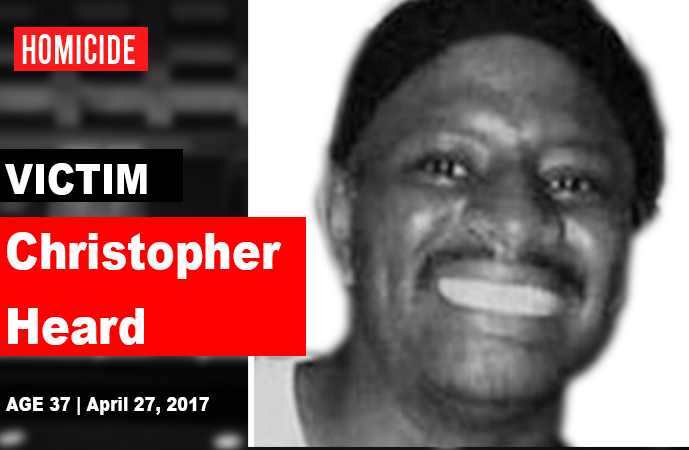
Thank you for reading D.C. Witness. Help us continue our mission into 2024.
Donate NowBy
Andrea Keckley [former]
- July 27, 2021
Court
|
Daily Stories
|
Featured
|
Homicides
|
Shooting
|
Suspects
|
Victims
|
The first homicide trial to come to the DC Superior Court in more than one year ended with a jury convicting two men of murder in connection with a 2017 shooting.
Christopher Heard was 37-years-old when he was shot on April 27, 2017, on the 2300 block of Ainger Place, SE. On July 26, a jury found 35-year-old Nyekemia Everett guilty of first-degree murder while armed, conspiracy, attempted robbery while armed, possession of a firearm during a crime of violence, fleeing a law enforcement officer and four counts of obstruction of justice. His 41-year-old co-defendant, Malik Hewitt, was found guilty of felony murder while armed, conspiracy and attempted robbery while armed. Hewitt was also found not guilty of possessing a firearm during a crime of violence and first-degree murder while armed. Everett was found not guilty of two counts of obstruction of justice.
Heard was, as the prosecution called him, “down on his luck” when he was killed. He had recently gotten out of jail and didn’t have anywhere to stay. A friend agreed to let him live with her. During the trial, she testified that she knew Heard was selling the drug PCP to make money but did not allow him to sell or smoke it in her home.
“It’s because of that drug trade that he was targeted by the defendants,” said the prosecution, who argued that Everett and Hewitt plotted to rob Heard.
Another witness, who said she was with the defendants before, during and after the homicide, testified that Everett told her and Hewitt he needed money, and Hewitt said Heard supposedly had a lot of money from selling PCP. She said the defendants told her to ask Heard if he had PCP, explaining that, since she is a woman, his guard wouldn’t be as high when selling drugs to her.
When the prosecution played surveillance footage from the early hours of April 27, a black car was seen arriving at the housing complex where Heard was staying. A man and a woman could be seen getting out of the car. During the trial, the witness identified herself as the woman and Everett as the man.
This witness confirmed that she was receiving a deal for a lesser sentence for her testimony. She said she could have been charged with felony murder, but took a plea deal that capped her potential sentence at 15 years for robbery and conspiracy. However, she said she is hoping to receive a probation-only sentence for her testimony.
The defense cast doubt on her telling of the events during the trial.
“The only evidence that Mr. Hewitt was involved in any robbery comes from [this witness], and it will become clear to you that she cannot be trusted,” Hewitt’s lawyer, Nikki Lotze, said during opening arguments.
In Everett’s lawyer, Michael Madden’s, opening statement, he said that on the day Heard died, he was high on PCP and attempting to rob the witness.
Footage played during the trial showing the witness telling police the incident wasn’t meant to be a robbery, but rather, that she called Heard because she wanted to try PCP. During the trial, the witness said this was a lie meant to protect herself and Everett. But Madden argued that she changed her story for “self-preservation” after the detective suggested she was potentially liable.
Lotze played video footage of a detective saying she was “going to be f***ed” if she lied. But the witness denied that the detective intimidated her into lying.
“He wanted to convey the point that I better tell the truth,” she said.
The jury began deliberations on Thursday, July 22. The following Monday afternoon they delivered their verdict.
The verdict comes after a suspension of jury trials in the DC Superior Court due to the COVID-19 pandemic that lasted more than one year. Everett and Hewitt went before a jury last year and the trial proceeded until closing arguments. But in August, a judge declared a mistrial due to the pandemic.
The two are scheduled to be sentenced on Oct. 14.
Follow this case